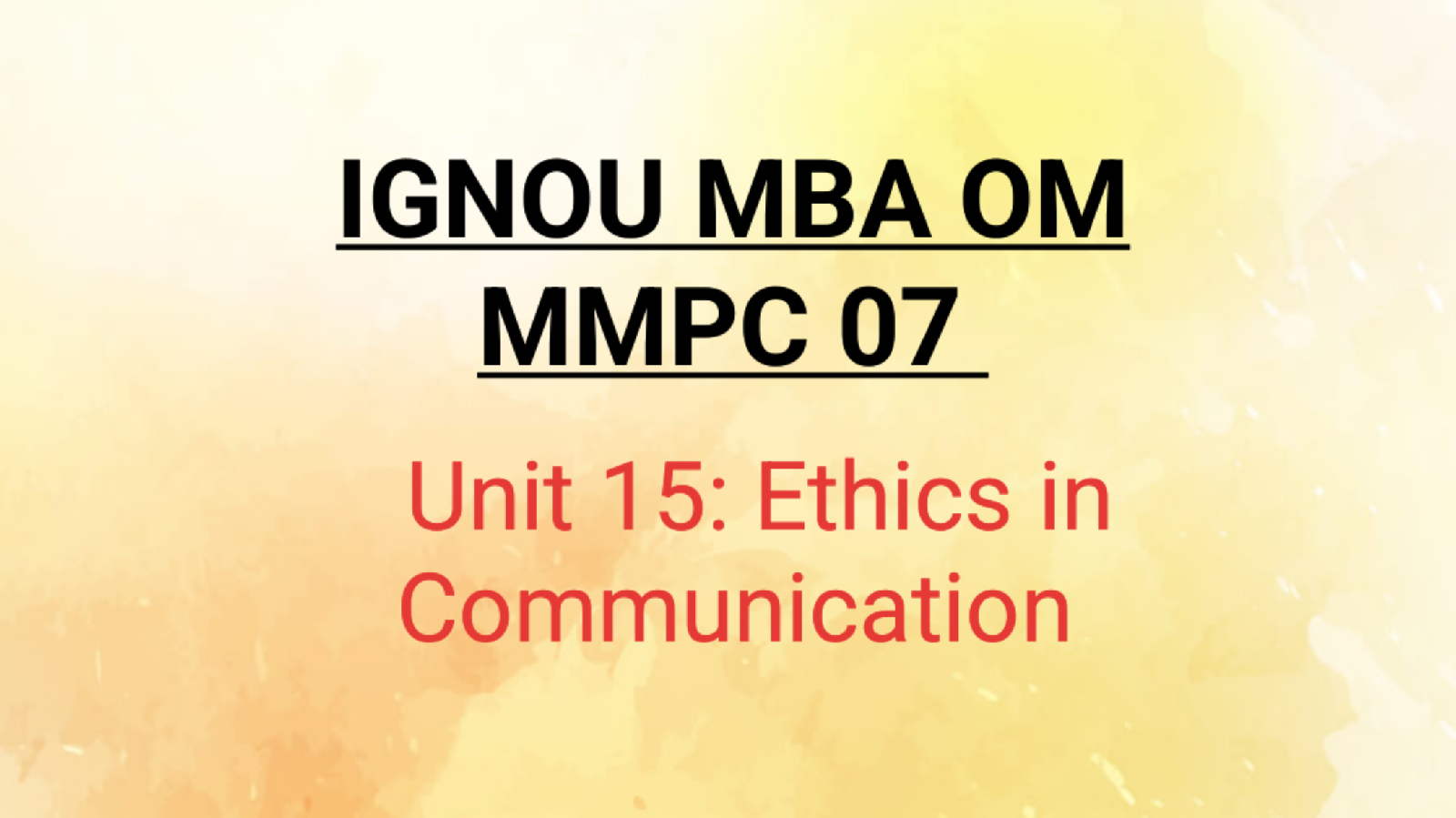Class for IGNOU MBA Subject MMPC-07: Business Communication
Unit 15: Ethics in Communication
1. Introduction to Ethics in Communication
Ethics in communication refers to the principles and standards that guide individuals and organizations in ensuring that their communication practices are honest, fair, respectful, and transparent. Ethical communication builds trust, promotes integrity, and supports a culture of openness and accountability. In a business context, ethical communication is vital for maintaining credibility with employees, customers, partners, and the broader community.
2. Importance of Ethics in Business Communication
-
Trust Building: Ethical communication fosters trust among stakeholders by ensuring that information is accurate, transparent, and reliable.
- Example: A company that discloses all relevant information to its investors, even when facing financial difficulties, maintains trust and credibility.
-
Legal Compliance: Many countries have laws and regulations that require businesses to communicate ethically, especially in areas such as advertising, financial reporting, and employee relations.
- Example: False advertising can lead to legal penalties and damage to a company’s reputation.
-
Corporate Social Responsibility (CSR): Ethical communication is a key component of CSR, where companies are expected to engage with the public in an honest and responsible manner.
- Example: A company that is transparent about its environmental impact and actively communicates its sustainability efforts aligns with ethical communication principles.
-
Employee Morale: Ethical communication within an organization promotes transparency and openness, leading to higher employee engagement and morale.
- Example: A manager who communicates honestly about company challenges and provides regular updates ensures that employees feel valued and informed.
3. Principles of Ethical Communication
-
Honesty: Ethical communication requires that all information shared is truthful and accurate.
- Example: A company providing detailed and accurate product descriptions to customers avoids misleading claims.
-
Transparency: Information should be presented in a clear and open manner, without hiding or distorting important facts.
- Example: A CEO addressing a public relations crisis by explaining the situation fully and answering all relevant questions exemplifies transparency.
-
Respect: Ethical communication respects the dignity and rights of all individuals, avoiding discrimination, harassment, or exploitation.
- Example: A business refrains from using offensive language or imagery in its marketing campaigns, ensuring respect for cultural differences.
-
Fairness: Communication should be impartial and objective, providing all stakeholders with a fair and balanced perspective.
- Example: An HR department that communicates promotion and hiring criteria clearly and ensures a fair recruitment process.
-
Accountability: Ethical communicators take responsibility for their words and actions, acknowledging mistakes and correcting misinformation when necessary.
- Example: A company issuing a public apology for a product defect and taking steps to compensate customers.
4. Ethical Issues in Business Communication
-
Misleading Advertising: Providing false or exaggerated claims about a product or service is a violation of ethical communication principles.
- Example: A company falsely advertising its product as environmentally friendly when it is not, risks damaging its reputation and facing legal repercussions.
-
Confidentiality Breach: Sharing confidential information without consent is an unethical practice that can lead to loss of trust and legal consequences.
- Example: An employee leaking sensitive information about a company’s upcoming merger to the media.
-
Manipulation and Deception: Using communication to manipulate others or deceive stakeholders undermines ethical standards.
- Example: A business inflating financial projections to secure investment funding is engaging in unethical behavior.
-
Discriminatory Communication: Any form of communication that discriminates based on race, gender, religion, or other factors is unethical and can lead to legal and social backlash.
- Example: A company sending out promotional materials that contain biased or stereotypical portrayals of certain groups.
-
Plagiarism: Using someone else’s work or ideas without proper attribution is a violation of ethical standards in communication.
- Example: A company copying a competitor’s marketing campaign without permission or acknowledgment.
5. Ethical Theories in Communication
-
Utilitarianism: This theory focuses on the consequences of communication and suggests that ethical actions are those that produce the greatest good for the greatest number.
- Example: A company deciding to disclose potentially damaging information to the public because it believes it will prevent harm in the long term.
-
Deontological Ethics: This theory emphasizes that actions are ethical if they adhere to a set of rules or principles, regardless of the outcome.
- Example: A business refusing to bribe a foreign official, even if it means losing a lucrative contract, because bribery is against its ethical principles.
-
Virtue Ethics: This theory stresses the importance of the communicator’s character and moral virtues, such as honesty, integrity, and fairness.
- Example: A CEO who prioritizes ethical decision-making and encourages employees to act with integrity in all communication.
6. Ethical Communication in Digital Media
-
Social Media Ethics: With the rise of social media, businesses must ensure that their online communication is ethical, avoiding false claims, offensive content, or the spread of misinformation.
- Example: A company transparently addressing customer complaints on social media and avoiding the temptation to delete negative comments.
-
Privacy and Data Protection: Ethical communication in the digital age involves respecting individuals’ privacy and protecting their personal data.
- Example: A company clearly communicating how it collects and uses customer data and ensuring it complies with data protection regulations like GDPR.
-
Intellectual Property Rights: Businesses must respect intellectual property rights by ensuring that all content shared is original or properly attributed to the owner.
- Example: A company using stock images with proper licenses instead of copying images from the internet without permission.
7. Case Study: Ethical Crisis in Corporate Communication
Case Study: Volkswagen Emissions Scandal
Volkswagen (VW) faced a major ethical crisis when it was discovered that the company had installed software in its diesel vehicles to cheat emissions tests. The communication from VW was initially deceptive, as the company did not disclose the true nature of the problem. When the scandal broke, VW faced widespread criticism for its unethical communication practices, leading to significant reputational damage and financial penalties. The case highlights the importance of honesty, transparency, and accountability in business communication.
8. Experiment and Case Study
Experiment 1: Ethical Decision-Making in Communication
A company created an internal ethics committee to review all external communications. The committee evaluated whether each communication piece adhered to ethical principles such as honesty, fairness, and transparency. Over time, the





















